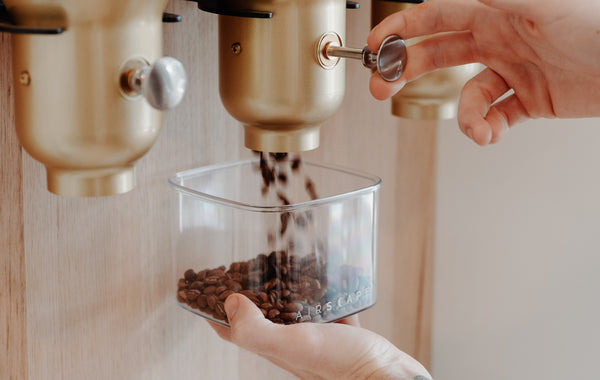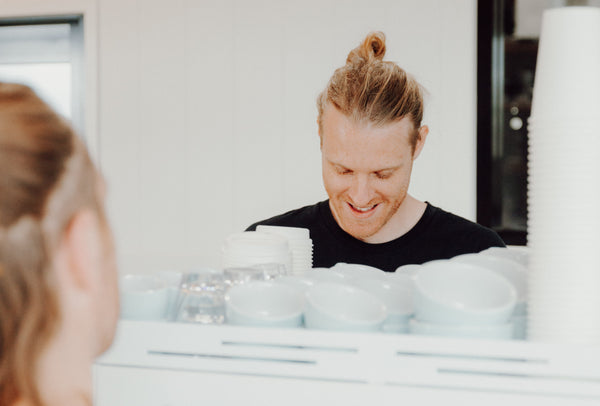We know you LOVE stale coffee..BUT…
Freshness is important, and you don’t want to be buying stale beans (like most beans available in supermarkets). If you are completely out of coffee and you’re about to buy some super fresh beans (like one or two days from the roast date), then you’d get home, have some awesome crema and be thinking you are winning, until…. you taste it! You might actually still think it tastes good enough, but you are most likely missing out majorly on the coffee's potential flavour. During coffee roasting, carbon dioxide is formed due to the reactions that occur during the roast. The carbon dioxide is trapped and slowly diffuses from the beans. We call this ‘degassing’ and it happens over one to two weeks depending on the coffee and roast style.

Espresso Roast:
Espresso brewing is more affected by a coffee that is ‘too fresh’. This is because brewing on an espresso machine is a much shorter brew time than other brewing methods. When using coffee that is ‘too fresh’ the carbon dioxide bubbles have a greater effect on the end result. It is especially important when brewing on an espresso machine to ensure you are using beans that have degassed for at least a week if not longer.
Espresso brewing is more affected by a coffee that is ‘too fresh’. This is because brewing on an espresso machine is a much shorter brew time than other brewing methods. When using coffee that is ‘too fresh’ the carbon dioxide bubbles have a greater effect on the end result. It is especially important when brewing on an espresso machine to ensure you are using beans that have degassed for at least a week if not longer.
For example we recommend using our espresso blend 10 - 12 days from the roast date, as we find from that point, and for two weeks after is the blend's optimal flavour window.
Note: This is all based on good storage conditions (see below)
Note: This is all based on good storage conditions (see below)

Filter Roast:
Filter Roast coffee is roasted lighter, so technically it degasses slower. You’d think you would need to wait longer before brewing filter coffee, but here’s the curveball.. because you are brewing for a longer time with a plunger or pour over etc, the coffee is more forgiving with a fresher roast. So some say you’re fine to start brewing three to four days from the roast date.
Does Climate/Temperature affect the ageing process?
Yes, it will affect how fast or slow the coffee degases, so those living in colder climates will find that the coffee will taste fresher for longer, and the optimal flavour window is a bit later than those living in warmer climates. Depending on where you live, you’ll potentially notice a difference in how long it takes the coffee to degas in winter versus summer.
How should I store my coffee beans to make them last longer?
Cool Dry Place: The general rule of thumb with coffee storage is to keep it away from light, heat, moisture and air. An airtight container is great, or if the bag your coffee came in has a zip-lock seal, you can use that. Store in a cool dry place, this is generally the easiest storage method. But if you want it to last long term read our suggestions below.


The Fridge: is not a great place to store coffee in any form, ground or whole beans, even if in an airtight container. It isn't cold enough to keep your coffee fresh for that much longer, and because coffee works as a deodorizer, it will absorb all the aromas in your fridge. But this works great if you have a smelly fridge, use up some old, not yummy coffee, grind it and leave in a jar without a lid. It will make your fridge smell amazing, great for covering over the bad smells.
The Freezer: The freezer is not recommended if you don’t have a fully airtight/vacuum sealed bag or container. However, if you want to store coffee long term in the freezer, you can vacuum seal, or use a container that you can fill to the brim, leaving no room for air. Ideally you seal each dose amount that you want individually, then grind straight out of the freezer. You’ll find many specialty coffee cafes starting to use this method for those expensive/rare, high end coffees, to ensure they don’t go stale before they use it all. It essentially allows you to freeze the coffee in time, once you’ve found the right amount of days from roast date.
Note: If you simply put the whole bag in the freezer, you may encounter deterioration of the coffee when taking it in and out of the freezer, hence we recommended freezing each dose. Also be careful not to allow any ice particles into your grinder hopper, this can cause clogging and other moisture related issues for the grinder.

Look we could go on and on about coffee science, but let’s keep it simple here, if it’s enjoyable we are happy right? We’re here to help you find how to make coffee more enjoyable. So here’s the short version.
Here are some simple takeaway recommendations:
-
Don’t use espresso roast until at least seven days after the roast date
(even better if you can wait 10 - 12 days). - Don’t use filter roast until at least 4-5 days after the roast date.
- Avoid any coffee that only has a ‘best before’ date, and not a roast date (most supermarket coffee).
In saying all of this, if you are all out of coffee and you have some slightly fresh coffee sitting there, just brew it up and see how it tastes. If it is a quality coffee bean it’ll most likely still taste better than a cheap coffee bean, and depending on the coffee and roast level it might still be nice for you on either side of those general recommendations.
A note to Cafe Owners:
This is some basic easy to digest info for home coffee brewers. If you are operating a cafe, I’d strongly suggest working with your local coffee roaster to get into a good ordering and ageing routine to be hitting the optimal flavour profile for your blend each week, so you are showing your customers the best that coffee can offer. Some local roasters will help age the coffee a week ahead for you, so you don’t need to store large amounts of coffee at your cafe.




Leave a comment